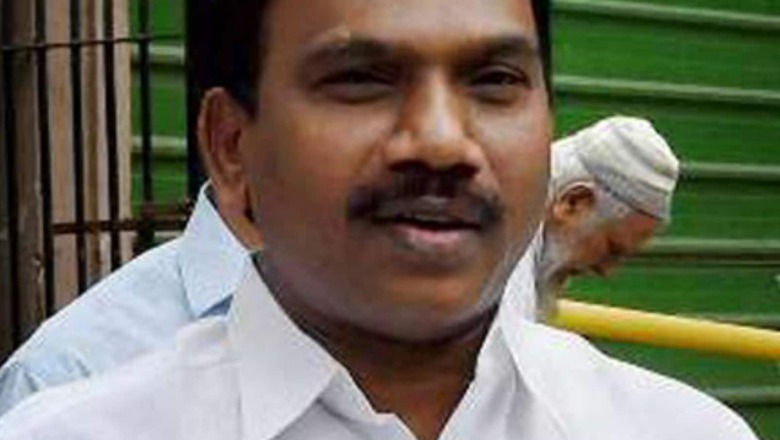
views
DMK, the ruling party of Tamil Nadu, has raised a secessionist demand if the state is not given autonomy. Party MP A Raja, in the presence of DMK president and Tamil Nadu chief minister MK Stalin, in fact, warned the Centre to give Tamil Nadu more rights or else the next stage would be a battle for separate nationhood.
As per PTI, Raja said, “I am telling Amit Shah and the Prime Minister with utmost humility, I implore you in the presence of (our) leaders on the dais, our chief minister is journeying on the path of Anna (CN Annadurai, former CM and DMK founder), do not push us on the path of Periyar. Do not make us seek a separate country. Give state autonomy and we will not rest till then.”
According to Raja, the DMK had so far kept aside the demand for a separate nation, as envisioned by Erode Venkatappa Ramasamy, popularly known as Periyar, the father of the Dravidian movement, but the party’s patience is now running out.
The truth though is that the demand for a separate Tamil nation was dumped long back, both by Periyar and Anna.
Dravidian duo
The Dravidian movement in Tamil Nadu was driven by Periyar and Anna. They opposed the imposition of Hindi, were against the influence of Brahmins in the society, and wanted a separate nation for the region speaking Dravidian languages, calling it Dravida Nadu.
The demand started with the anti-Hindi agitation in Tamil Nadu in 1938. The 1940s and 1950s saw its peak. Periyar was demanding Dravidasthan or Dravida Nadu. He wanted a separate nation across southern India. His demand continued till 1956 when as per the State Reorganisation Act, states were divided based on linguistic lines. Demanding a separate country became meaningless for Periyar after it. Instead, he now focused more on Tamil rights and the Tamil Nadu Thamizharukke (Tamil Nadu is only for Tamils) demand.
But his lieutenant, Anna, who after differences with him later formed a different party, refused to budge. He was still persistently voicing demands for a separate country and used to speak on it even in the Indian Parliament.
Anna said this in the Rajya Sabha in 1962: “I claim, Sir, to come from a country, a part in India now, but which I think is of a different stock, not necessarily antagonistic. I belong to the Dravidian stock. I am proud to call myself a Dravidian. That does not mean that I am against a Bengali or a Maharashtrian or a Gujarati. As Robert Burns has stated, ‘A man is a man for all that’. I say that I belong to the Dravidian stock and that is only because I consider that the Dravidians have got something concrete, something distinct, something different to offer to the nation at large. Therefore it is that we want self-determination.”
Politicians of Tamil Nadu were not alone in raising this demand for a separate country. Secessionist calls were also being raised from Punjab and Nagaland. It was a real possibility that in future, local and regional leaders from many other states as well, based on their cultural and linguistic differences, could make similar demands.
To control such secessionist threats, through the 16th Amendment, the words “the sovereignty and integrity of India” were added to Article 19(2) of the Constitution. After this amendment, raising such secessionist threats became unconstitutional and illegal.
Article 19 of the Indian Constitution ensures freedom of speech and expression but to curb such secessionist threats, a restriction was added through the 16th amendment, as inserted in Article 19 (2), “Nothing…..shall affect the operation of any existing law, or prevent the State from making any law, in so far as such law imposes reasonable restrictions on the exercise of the right conferred…..In the interests of the sovereignty and integrity of India, the security of the State, friendly relations with foreign States, public order, decency or morality or in relation to contempt of court, defamation or incitement to an offence.”
The 16th amendment, also called the anti-secession bill, banned secessionist advocacy and was a clear warning to secessionists like Anna who had to suspend the demand for a separate country. Tamil Nadu’s separatist movement, in fact, was a root cause. Certain political sections in the state wanted to use the electoral process to demand a separate nation from India in the name of people’s opinion, something that was used by the Muslim League in colonial India to demand the partition of the country.
After the 16th amendment, Anna had no option but to leave his demand for a separate nation as continuing it and following it through protests and other political action meant it would be an illegal activity that could, in turn, have compromised his political career. He said this while putting an end to his secessionist call: “I have given up the Dravida Nadu demand. But not even one of the reasons for seeking Dravida Nadu.”
Legal implications
A Raja’s comment seems political in nature. The NDA rules the country and the states ruled by the non-NDA parties routinely complain that the Centre discriminates against them. Raja’s statement reflects more of a Centre-states battle, aligning with the DMK’s focus, “autonomy of the states with federal structure at Centre” that it has followed since 1970.
Also, as explained by the Supreme Court of India and many legal experts, calling for “freedom of a state/UT” verbally is not a crime until it is followed by violence and related action on the ground.
Read all the Latest News, Breaking News, watch Top Videos and Live TV here.


















Comments
0 comment